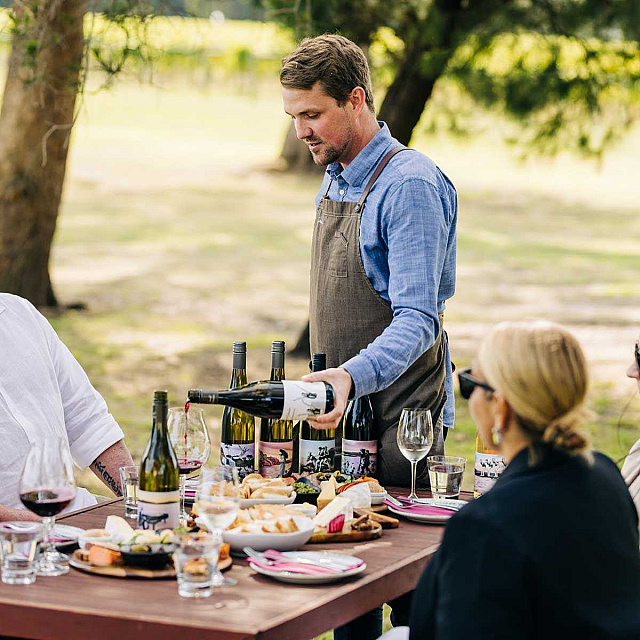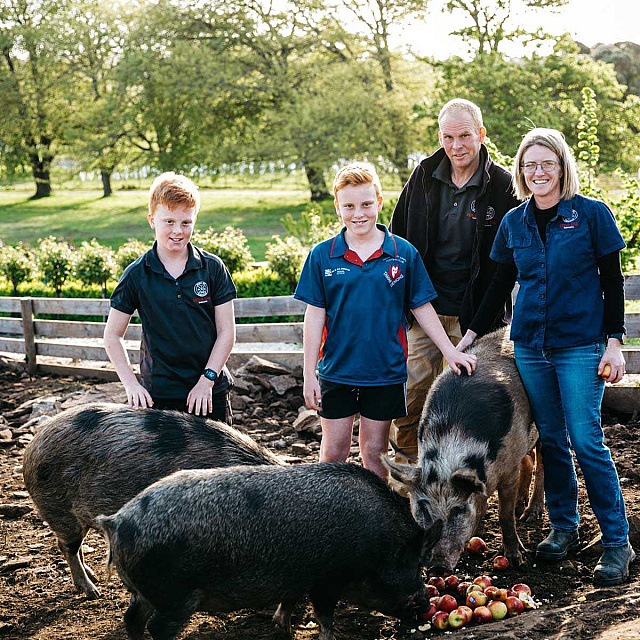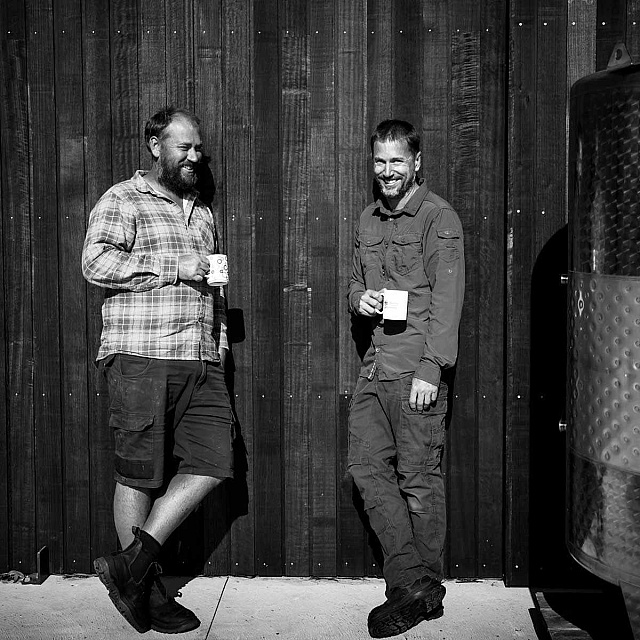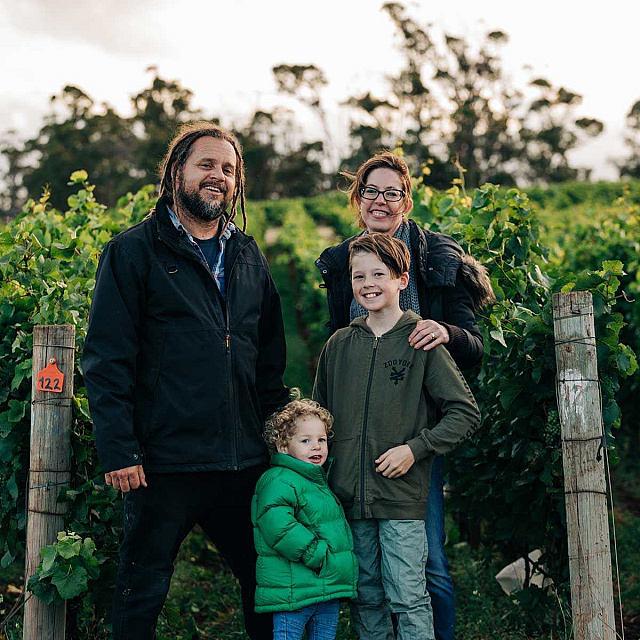Tassie's Wine Stories
Our Tassie wine folk are a diverse bunch but all share a few things in common – a requisite steely resolve and a penchant for doing things their own way, with a dose of patience and confidence for good measure. Even when the going gets tough. Sometimes, very.
A common thread through all of our Tassie wine stories is the power of this little island’s beckoning. For some, calling them back home, for others tempting them south with an irresistible combination of challenge, intrigue and seemingly limitless potential. Either way, this place has a way of sinking its claws into you.
Our wine producers have learned – often the hard way – to accept the challenges, for these are part of the tapestry which makes our little island and its wines what they are. Others come with a long list of reasons as to why Tassie isn’t the ideal place to grow grapes; some of the world’s harshest and most unpredictable conditions to name just two. But the crisp southerly breezes (and roaring winds) down here breathe fresh with optimism. Trials, tears and near-defeats aside, would they be anywhere else? Absolutely not.
We asked Why Tassie? They all said, Why Not?
The story of Small Wonder wines is a refreshing fusion of old and new. Formerly known as Goaty Hill, a new name for this picture-perfect vineyard poised amongst native bushland at the top of the Tamar Valley signals a new and exciting chapter. With organic certification and winery construction underway, this future has now well and truly commenced.
Robert Stewart, cellar door manager at Small Wonder, says that what he loves most about wine is its tendency to be ever-evolving and changing, both with each season and more generally over time. This evolution is at the forefront of the modern Small Wonder story too, as the team work toward on-site production of certified organic wines. The vineyard has recently achieved these credentials, while the winery will complete a hyper-local fruit philosophy and vineyard vision.
This organic certification reflects Small Wonder’s key goal – to produce not only the best wines possible, but to do so through working in harmony with nature. For (as we know all too well in Tassie) both the greatest challenges and potential lie in the hands of Mother Nature.
We asked Robert about the greatest learnings to date and he said, ‘the more you know, the less you know’. The real discovery is through exploration, with experimentation an important (and rewarding) part of what happens at Small Wonder. For guests to the cellar door, it’s all about the interconnectedness of great wine and special memories. That sounds like an experiment well worth participation – although, we're sure that this kind of experimentation is with a very clearly defined focus.

Launched in 2017 and not the first winemaking endeavour of accomplished Tasmanian winemaker Greer Carland, Quiet Mutiny is the culmination of over 15 years of wine-crafting experience. Admittedly finding herself a little off course in her own career at the time of Quiet Mutiny’s inception, the winds of circumstance and a ‘why not’ attitude steered the brand into existence with Carland at the helm.
For Greer, Tasmania has always been home – work overseas or on the mainland has felt like a temporary passage before arriving back on her island’s shores. She says that she takes inspiration from the island and finds her own ‘groove’ in the styles of cool climate wine made from Tasmania’s southern vineyards. Community is also something that is central to Tassie’s wine and is something which Greer says that she values highly. At Quiet Mutiny, grapes are sourced from family and industry friends then crafted using traditional and uncomplicated techniques.
And the name? The tale of convict Charlotte Badger struck a chord with Greer. Transported to Van Diemen’s Land as a convict, she staged a mutiny in the island’s Northern waters and sailed to freedom in New Zealand. With no loss of life (those against the operation were left behind) it was a quiet mutiny.
Although the Quiet Mutiny fable is shrouded in fitting mystery and intrigue (smile or giggle at the story if you wish, Greer certainly isn’t one to take herself too seriously), there’s no doubt that Carland is making serious(ly good) wine. When asked about Quiet Mutiny's greatest achievement, Greer says ‘We’ve won a few trophies, which has been really nice’. A typical understatement from the modest three-time finalist Young Gun of Wine Winemaker. However, Greer says the greatest accomplishment is reflected in the feedback Quiet Mutiny receives from its followers; she says that ‘to know that what you are making is treasured and valued is super ace’.
Since walking the plank and falling feet first into Quiet Mutiny, Greer’s decision to take control of her own destiny (just as Charlotte did in 1806) has proven to be a very successful one. So if the Quiet Mutiny story were to have a title what would it be? Greer says ‘Surrendering to the winds of destiny’ or ‘In mutiny we trust’. Doesn’t everyone need a little Quiet Mutiny in their lives?

With the same focus and precision that typifies her winemaking today, Holm Oak’s Bec Duffy firmly decided that she wanted to become a winemaker at the grand age of 14 after completing high school work experience at Pipers Brook Vineyard. With no previous wine education, Bec embarked on a winemaking career via university in Adelaide and winemaking experience in Western Australia.
Growing up on Bass Strait’s windswept King Island (they make them tough out there) Bec has always been up for a challenge. Returning to Tassie in 2006 she took on a ‘pretty run down vineyard’ and winery in the Tamar Valley with some winemaking know-how but no vineyard or business experience. Fortunately, Bec had joined forces with the other half of the formidable Holm Oak family duo shortly thereafter; husband Tim, who is a third generation grapegrower (it is noted, also with a very handy accounting degree).
Since then, Bec and Tim have spent the 17 years building their business into one of Tasmania's most highly regarded family-owned wine brands. Crafted with their own distinctive style, Holm Oak is down to earth, confident and a little unpolished. It’s worth noting that ‘a little unpolished’ is not to be confused with any lack of attention to detail. A peek into the meticulous vineyard or the cellar's complex array of individual grape varieties and carefully chosen barrels – patiently awaiting their intended blending purposes – all reflect this precision.
So what’s their secret for success? Bec says consistency, focus and confidence – having a clear goal in mind and consistently work towards that. ‘Don't get distracted by what others around you are doing. Know that you are doing the right thing for you, your family, and your wines. Work out what you are good at and do that really well’. To be named one of James Halliday’s Dark Horse Wineries just 8 years after it all began, it seems as though Bec and Tim figured that out pretty early on.
We asked Bec for a highlight in reflecting on the evolution of Holm Oak; ‘I'm pretty proud of the whole lot. To build a solid business that makes great wine, covering agriculture, manufacturing, tourism, retail, wholesale and export markets, whilst raising a family is tough. To still be doing it and enjoying it (most of the time) is an accomplishment of which I'm proud.’

The Hughes brothers grew up in Tasmania's region of milk and potatoes (for new players, that’s the fertile North West) before making the move south to Hobart and university. While adult life took them to other places, Jonny speaks of being drawn to the South of Tassie and Matthew of being drawn back to his island home from interstate, with young family in tow. The plan wasn’t to go into business together – in fact, it hadn’t even been discussed when the pair found themselves visiting a vineyard on the shores of the d’Entrecasteaux Channel, neighbouring the Huon Valley.
Noticing that the property next door was for sale, Matthew asked Jonny if this would be a suitable place to grow grapes. The answer was yes and shortly thereafter they unexpectedly found themselves the new owners of an old fruit orchard. It was a picture-perfect location – slope, aspects, low frost risk and limited disease pressure (the stuff of viticultural dreams). More importantly, it was the requisite ‘gut feeling’ both brothers had that really sealed the deal and Jonny confesses that this intuition was disproportionate to any scientifically informed research.
This was in 2010 and in 2016 the first Mewstone wines were made (aside from a small harvest in 2015, making just a handful of bottles). The inaugural wines were shared over a birthday dinner at a favourite Hobart restaurant and only winemaker Jonny knew the origin of the mysterious, unlabelled bottle on the table. After the first sip, Matt said ‘that’s not bad’, their mum agreed that it was ‘pretty good’. And so Mewstone Wines began.
It certainly hasn't been all smooth sailing, with bushfires and small crops presenting challenges along the way. Nonetheless, two highly-regarded wine labels, a winery and cellar door now sit among an impressive list of achievements (Jonny says that working alongside your brother for over a decade is also one of them). With a focus on producing wine from the vineyard and onsite winery to the (lucky) consumer's glass in the cellar door, the winery and cellar door symbolise the essence of what Mewstone is trying to achieve.
Throughout the journey, the Hughes brothers say that their number one lesson has been a willingness to ‘have a crack’ at doing something new and different. Between the two wine labels (Hughes & Hughes and Mewstone), there are 22 different wines, so it could be said that the brothers like to ‘have a crack’ reasonably often.

Choosing Tassie as the location to start their wine journey as a husband and wife team, Fran Austin and Shane Holloway moved to the island from the Adelaide Hills and Western Australia respectively. From here, the Delamere journey began with a humble quest for domestic chickens. The original owners of Delamere had excess numbers and the young couple were invited to dinner one evening before a small selection of their plucky wards were to be handed over. During the evening it was revealed that the vineyard was ‘informally’ on the market. There was no doubt that Shane and Fran had fallen in love with Tassie and – in a slightly alternative fashion – Delamere has fallen into their custodianship.
Here at their vineyard home, Fran and Shane have created a family and raised two children – one of their greatest achievements. Another is finding a way for their two personalities to work together productively. Shane says in jest ‘we work as a team, and we do it Fran’s way’ … The plot thickens however, when the story is told of a covert in-house operation whereby one hid wine from the other (we’re now fielding guesses as to who was who) for over a decade. Cue the result, the Delamere Late Disgorged Blanc de Blanc and the vineyard’s most exclusive product, the pinnacle of Delamere’s fine sparkling wine ethos and the flagship wine in the range.
All jokes and shenanigans aside, Fran and Shane’s partnership is definitely more than the sum of its parts. As a small family business where the fruit is grown, the wine is made and a cellar door welcomes guests, Fran admits that there is a lot of pressure, frayed tempers and even tears at times. The recipe for success? The couple are yet to come across a situation that can’t be improved with a delicious meal and a bit of music, enjoyed with family and friends.
It perhaps goes without saying, then, that the most valuable lesson along the journey has been patience; patience waiting for young vineyards to mature and patience to ripen each vintage’s fruit to perfection. Patience to slowly extract the finest juice from the press and patience through the many years of maturation that it takes to create the finest quality sparkling wines. Nowadays, that patience is something that Fran and Shane have down to an art form (along with producing some of the island’s most sought-after sparkling wine).

This project is supported by the Tasmanian Government
through the Department of State Growth.


